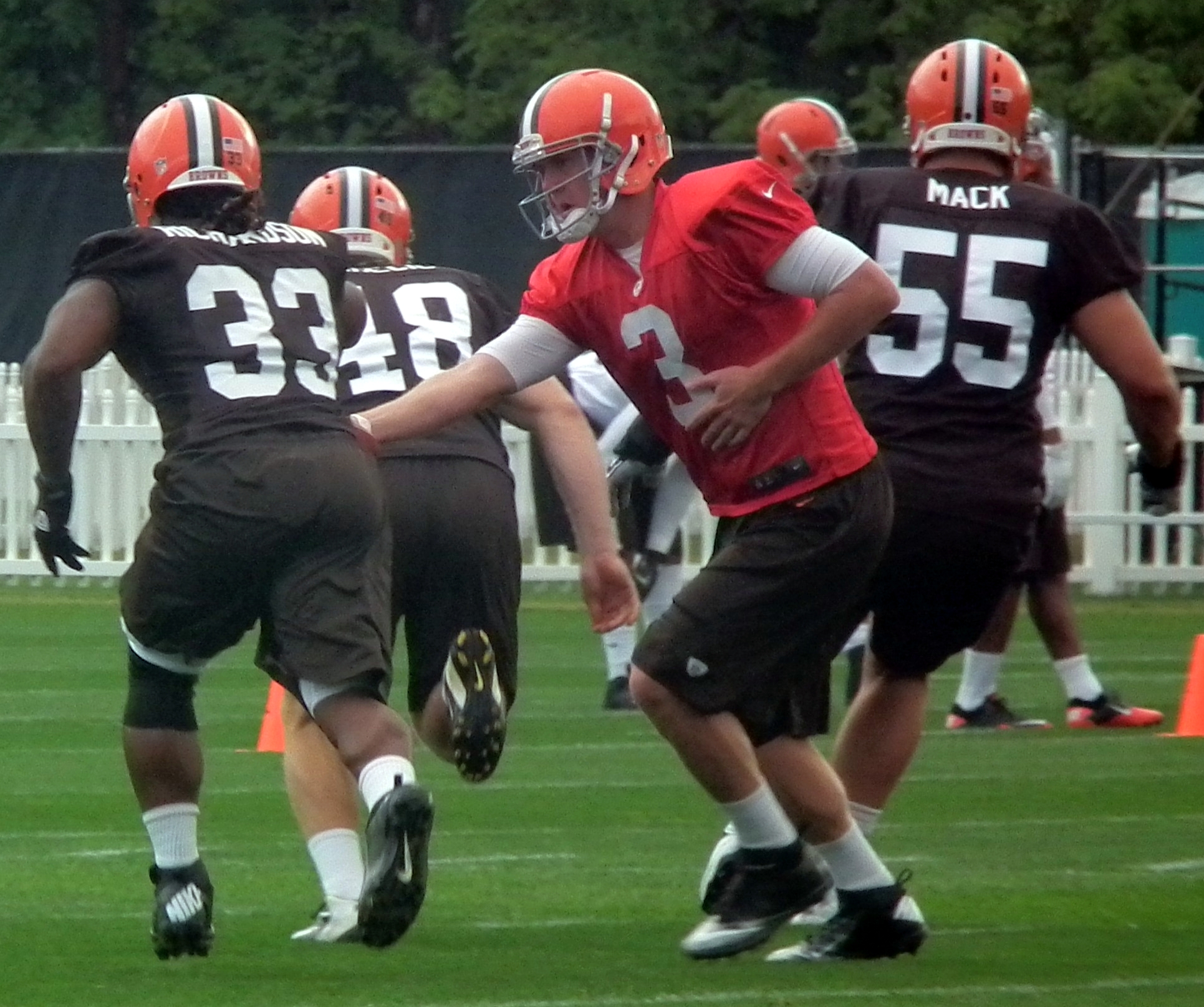 |
| Trent Richardson is on his way out of town. Could Brandon Weeden be next? (Flickr) |
Earlier this evening, ESPN's Adam Schefter posted to Twitter that the Cleveland Browns agreed to trade Trent Richardson to Indianapolis for the Colts' 2014 first round pick. Here's the upshot for each team:
How The Colts Won The Trade:
Plain and simple - they got a highly talented running back who was the third pick in the draft less than 18 months ago. In his rookie season, he scored 11 touchdowns on the ground and caught 50 passes. Granted, he did so on one of the worst offensive teams in the league (they finished 27th in DVOA last season), so it wasn't very difficult for him to rack up stats, simply by virtue of the fact that even the most inept offenses manage to gain yards (if only seemingly by accident), and Richardson was the only player on the roster capable of doing so.
Regardless, Richardson was the third pick in the 2012 NFL draft. Based on where Indianapolis might expect to finish, the 2014 first-round pick they traded to get him will probably be in the middle of the round or later. By that logic, trading the #3 pick in the 2012 draft for, say, the #18 pick in the 2014 is good value.
Furthermore, running back was a position of need for the Colts. They signed Ahmad Bradshaw in the off-season to bolster their backfield, but he's only on a one-year deal, has an injury history, and isn't particularly effective on third downs. And after Vick Ballard went down for the season with a torn ACL, they didn't want to turn to a player that drew the ire of Peyton Manning (Donald Brown), or one apparently named after paint (Kerwynn Williams, their 7th-round pick this year). Richardson can step in and be an immediate upgrade over every running back on the roster.
Offensive Coordinator Pep Hamilton was also Andrew Luck's coordinator when Luck was at Stanford, and during those years, the Stanford teams ran more than they passed. It was a power-running offense with a lot of designed play-action and roll-outs to take advantage of Luck's athleticism. It wasn't a spread offense like the Colts have been running. Richardson might allow them to go back to those roots, where Luck was at his best.
How The Browns Won The Trade
The Browns roster, especially on offense, is in disarray. The four "centerpieces," Richardson, quarterback Brandon Weeden, and wide receivers Greg Little and Josh Gordon, were rookies last season, all drafted under the previous front office, which was run out of town by a rioting public after last season. The new regime has placed a priority on the defense, using their top four picks in April's draft on that side of the ball.
The previous regime also had a history of trading away picks. In order to get Richardson in the 2012 draft, the Browns dealt 4th, 5th, and 7th-round picks to trade up one spot. I'll repeat that. The Browns traded THREE draft picks to move up ONE spot. And the team they swapped with was Minnesota, who have a running back by the name of Adrian Peterson on the roster. I'm almost certain they weren't looking at another running back with their third overall pick.
So now, instead of surrendering draft picks and receiving middling value in return, they're selling their talent and receiving draft picks for their troubles. In the process, their distancing themselves from the previous front office, which probably isn't the worst idea.
Here's what the thought process might look like:
Given the state of the Browns offense, due to comically inept quarterback play, there's no chance the Browns make the playoffs until they upgrade that spot. Trent Richardson is a good running back, but he's that much better, if at all, than a handful of other running backs who were drafted much lower, like Alfred Morris (6th round in 2012), Jamaal Charles (3rd round in 2008), Stevan Ridley (3rd round in 2011), or Arian Foster (undrafted). That being the case, it might make sense to sell as high as possible on a running back that (a) isn't a difference-maker for the team right now, and (b) outside of his draft position, hasn't shown a huge potential to be a difference-maker in the future - he's averaged just 3.5 yards per carry over his first 298 career rushes, and just two of those rushes have gone for 20+ yards, the second-fewest among all backs with at least 200 carries over the last two years.
All things considered, there is a good argument for each side of the trade. It may seem like a defeat for the Browns to trade away a top pick from less than two years ago, especially one they paid a premium to acquire. But the current market for running backs isn't particularly strong - getting a first-round pick for any running back short of Adrian Peterson is probably a good value, especially when backs like Willis McGahee are still on the market. McGahee ran for 1200 yards in 2011 and was serviceable last year before his injury (he actually finished higher on both DVOA and DYAR leaderboards than Richardson did). Even if Richardson develops into a top-10 back, there's no guarantee that justifies his original draft position. The Browns might not end up winning the trade, but they certainly didn't lose it.
No comments :
Post a Comment